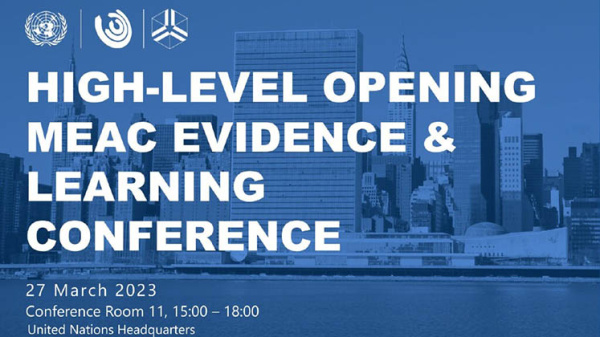The United Nations, national governments, NGOs, and local communities have long provided and supported a range of interventions to help individuals exit armed groups and reintegrate into society. Yet, despite decades of programming, there is a significant knowledge gap as to which interventions work effectively, for whom, and under which conditions. This scarcity of knowledge undermines effective programming, increasing the likelihood of recidivism and conflict resurgence.
The MEAC Evidence & Learning Conference sought to redress this knowledge gap by bringing together a wide range of policymakers, practitioners, and scholars to share empirical findings about transitions out of armed groups in Iraq, Nigeria, Chad, Niger, Cameroon, and Colombia. This multi-day conference commenced with a high-level opening day on Monday, 27 March 2023, where MEAC’s top-line findings were shared at the UN Headquarters. UNIDIR and UNU-CPR brought together a diverse group of experts to chart a way forward in light of the emerging evidence on factors that influence recruitment and those that promote reintegration progress.
This was followed by a two-day expert-level workshop at the Ford Foundation Center for Social Justice. The workshop allowed practitioners, policymakers, donors, and researchers to collaboratively identify how programme design and implementation can be adjusted to advance innovative, empirically based, cross-sector approaches to prevention and reintegration.
Ultimately, this conference marked an important milestone in enhancing the international community’s ability to prevent and effectively respond to armed conflict.
Event Reports
A summary of the High-Level Opening Session can be found here.
A summary of the Expert-Level Workshop can be found here.
Event recordings
Recordings of the High-Level Opening Session can be accessed on the UN Web TV.
Recordings of the panels held during the MEAC Evidence & Learning Workshop can now be accessed through the playlist on UNIDIR’s youtube channel, or below.
Programme
The opening day took place on Monday, 27 March 2023, 15:00-18:00 ET, in Conference Room 11 at United Nations Headquarters in New York. Following an introductory panel featuring MEAC project donors and UN partners, the opening day held two panels presenting original MEAC data and emerging findings from local experts on, 1) Factors that drive recruitment into armed groups in the Lake Chad Basin and implications for prevention interventions, and 2) Exit trajectories out of armed groups and implications for reintegration support.
Schedule
15:00-15:30 • Introductory Panel, featuring MEAC project donors and partners
15:30-16:30 • Factors that Drive Recruitment into Armed Groups in the Lake Chad Basin and Implications for Prevention Interventions
16:30-16:45 • Break
16:45-17:45 • Exit Trajectories out of Armed Groups and Implications for Reintegration Support
17:45-18:00 • Q&A
Building off the high-level opening day at the United Nations Headquarters on Monday, 27 March, a two-day expert-level workshop was held at the Ford Foundation Center for Social Justice. The workshop days featured 10 thematic panel discussions to share more detailed findings from MEAC and other sources of evidence, followed by interactive small group sessions, sometimes held in parallel, that gave participants the opportunity to workshop practical ways to respond and incorporate the various findings into policy and practice.
The workshop agenda and thematic sessions can be found here:
Participants
UNIDIR encouraged the participation of member states, UN practitioners, policymakers, academics, researchers, and experts working on or interested in issues pertaining to preventing and responding to armed conflict.
